Clinton Foundation locks down 50 ‘Commitments to Action’ to continue Caribbean recovery
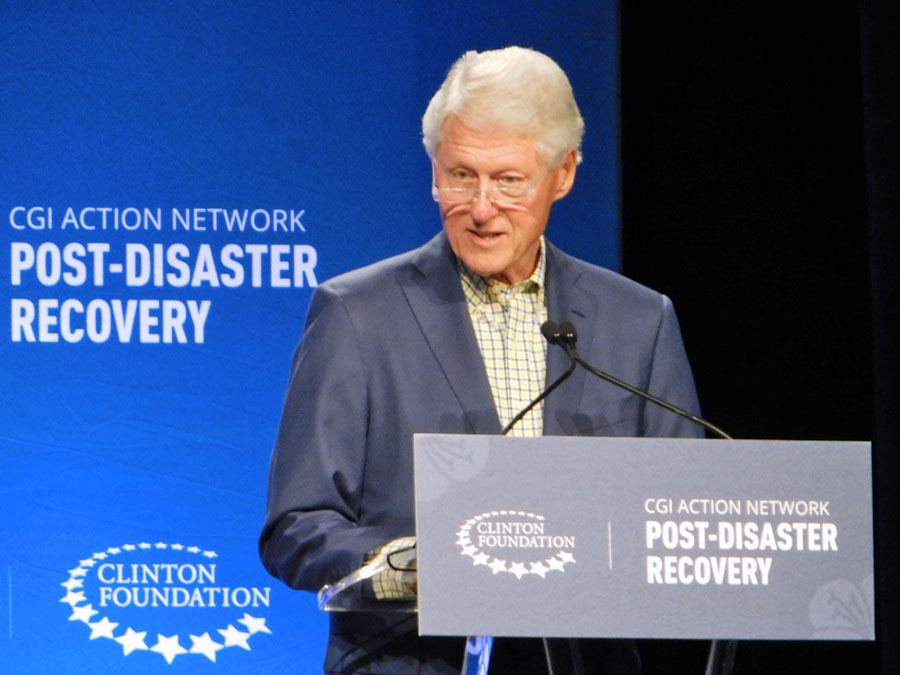
The Clinton Foundation, through its Clinton Global Initiative Action Network on Post-Disaster Recovery initiative, is pushing forward with its effort to work with government, business, and civil society partners to develop strategies and solutions to address hurricane recovery needs facing the region, while laying the foundation for a more resilient future.
President Bill Clinton, founder
and chair of the Clinton Foundation, convened the third meeting of the CGI network
to disclose a list of “Commitments to Action,” which are defined as specific
and measurable projects that address critical issues such as food security,
access to health care, small business support, sustainable tourism, and
renewable energy.
During a session at the
Convention Center, Clinton said the nonprofit will leave Puerto Rico this week
with more than 50 commitments in total to continue recovery efforts in the region.
“One of the things that will
come out of this Action Network when fully funded is about $8 million in green construction
and building, the renovation of nearly 200 community facilities, 130 of them
with solar components,” he said.
“I’m feeling pretty good about
where we are, but we’ve got a long way to go,” said Clinton. “Fifteen months
after Hurricanes Irma and María, our work is far from over. And it’s easy to
lose sight of that in this current environment when there something new, exciting
or distressing on the news every day.”
“Since we launched the Action Network,
we brought together more than 650 organizations with the common goal of helping
Puerto Rico, U.S. Virgin Islands and their Caribbean neighbors, particularly Dominica,
Antigua and Barbuda,” he said.
The network has rebuilt homes
and schools in Dominica, transitioned primary care clinics in Puerto Rico to
solar power and enabled every school child in the USVI to get vision, hearing
and dental screenings for the first time after the hurricane, he added.
The two-day meeting is taking place in San Juan focusing on issues such as disaster preparedness, agricultural production, mental health, energy efficiency, and workforce development.
The partnerships in place for Puerto
Rico are:
- A commitment from Inclusiv to build the Community Development Financial sector in Puerto Rico to be effective agents for redevelopment and resilience work on the island. The organization is guiding financial cooperatives in the process to become Community Development Financial Institutions by offering comprehensive training, workshops, technical assistance, resources and tools;
- Keystone Policy Center commits to working with the Puerto Rico Department of Education to recruit employers who will partner with PRDE to design and offer apprenticeships, internships, and other work-based learning opportunities to high school students in Puerto Rico.
- Tourism Cares committed to facilitating partnerships between tourism companies and micro, small, and social enterprises in Puerto Rico, to better integrate local products into corporate supply chains and inspire investment.
- Voz Activa committed to transforming women-led community kitchens into social enterprises in Puerto Rico.
- Libraries Without Borders and their partners committed to building the first hurricane resistant solar-powered pop-up library and makerspace in the world.
- Footprint Project will support the design and installation of an approximately 10kW solar array and a 30 kWh battery bank to power radio dispatch, communications, refrigeration and lighting for the Emergency Management Office of Vieques.
- Putnam Bridge Funding committed to fully transition Marina Puerto Del Rey to operate on solar power and invest a portion of the energy cost savings generated into the Padre Rufo public school in San Juan.
- Solar Libre committed to building a diverse, equitable, and inclusive solar industry by providing pathways to technical careers for women on the solar workforce.
- Voz Activa and their partners will create the first community-owned solar power source in San Sebastián.
- Puerto Rico Disability Community Relief Network, a consortium of five Puerto Rican organizations focused on the wellbeing of the disability community, will implement a training program for private, government, and nonprofit entities in Puerto Rico on how to incorporate the needs of people with disabilities into disaster preparedness and response work.
- To address the mental health service gap for older adults in Puerto Rico and the USVI, International Medical Corps will collaborate with partners to deliver trainings for approximately 255 health staff on mental health care for older adults.
- In addressing the residual trauma caused by Hurricanes Irma and María, The Cathexis Project seeks to create an environment for psychological healing, innovation, and economic liberation. The Cathexis Project is partnering with experts in the fields of Behavioral Health, Entrepreneurship, Leadership and Performance Coaching, to initiate an 18-month pilot program that will address the business resiliency and mental well-being of small business owners.
- The Humane Society of the United States and their partners committed to expand their Spayathon program. This program provides animals with free high-quality, high-volume spay/neuter surgeries and vaccinations to address pet overpopulation and support the local veterinary workforce by providing training and equipment.
- To address the mental health crisis in Puerto Rico after Hurricane Maria, VOCES will launch “Voces Resilientes,” an in-home therapy pilot program to address the needs of children and youth and their families in San Juan.
- To ensure water security for the community of El Real in Patillas, IsraAID, in partnership with the Inter American University of Puerto Rico, is working with members of El Real to build a slow-sand, gravity-based water filtration system.
- The San Juan Bay Estuary program and its partners are committed to developing the Mitigation Plan through a three-pronged approach: one that (1) collects the scientific community’s expertise, (2) builds on resources and capacity, and (3) implements resilience hubs, aimed at increasing awareness in communities.
- World Central Kitchen will extend their plow to plate program which is reduces food insecurity in Puerto Rico by offering direct funding and partnership to food-related small businesses and small holder businesses.
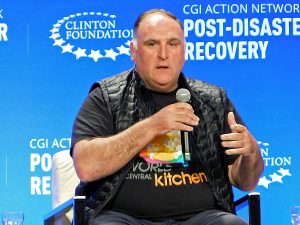
One of the participants in the panel that Clinton moderated was Chef José Andrés, one of the founders of World Central Kitchen, who said the private sector has been the “unsung hero” in the recovery efforts since the storms devastated Puerto Rico and the region.
Andrés, who landed in Puerto Rico several days after Hurricane María struck on Sept. 20, 2017, said when the World Central Kitchen saw how destructive the storm had been, it began feeding people. The volume increased as the nonprofit began getting calls from hospitals and elderly homes.
“We kept cooking and kept responding to the needs. We
started feeding people and the plan just happened,” he said, adding the World
Central Kitchen provided more than 3.4 million meals in Puerto Rico, with the
help of more than 19,000 volunteers.
Now, the nonprofit is supporting small farmers with funds to
help them develop projects so that eventually, Puerto Rico can cut down food
imports, Andrés said.
“World Central Kitchen will be committing, with help from
partners like you, $4 million so we can impact at least 200 farms across the
island, believing that farming is what gives resilience to places like Puerto
Rico,” he said. “We need good, smart infrastructure of small farmers spread all
over – that’s how we bring resilience.”
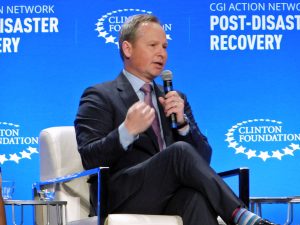
Meanwhile, Mark Okerstrom, CEO
of Expedia Group, said the travel platform has engaged with partners across the
Caribbean to rebuild, not just the tourism sector, but infrastructure as well.
“Our support of the Caribbean countries
goes well beyond what we can do beyond travel and toruism. We partnered to
install solar panels in Dominica, so if there’s another disaster they can get
up and running and have the foundation to rebuild,” he said.
“We did that because at the
time there wasn’t much more we could do but, we had to do something,” Okerstrom
said, adding that the company continues to work on infrastructure projects in
St. John and St. Thomas.
In Puerto Rico, Expedia teamed
up with the Puerto Rico Tourism Co. to help promote the island as a destination
to “our 675 million eyeballs that visit Expedia Group websites every month,” he
said.
“We’re making sure the world
was aware that Puerto Rico needs them to come and visit, maybe help, but also see
amazing sites it has to offer,” he said, adding that 18 moths after disaster, the
Caribbean has gotten back to 2016 levels, but not to growth.



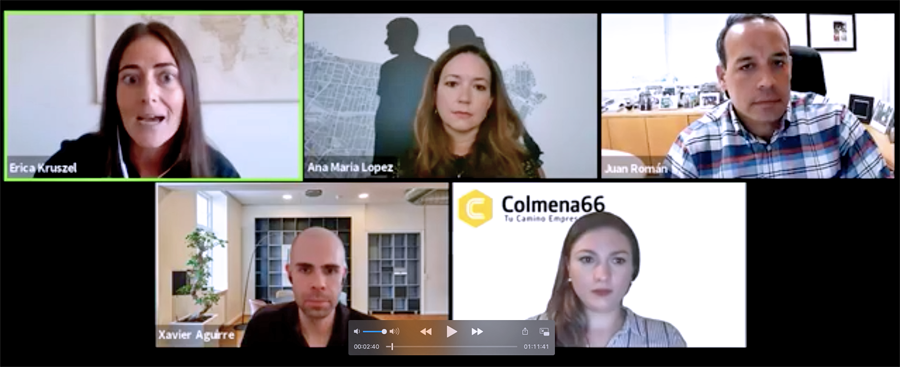
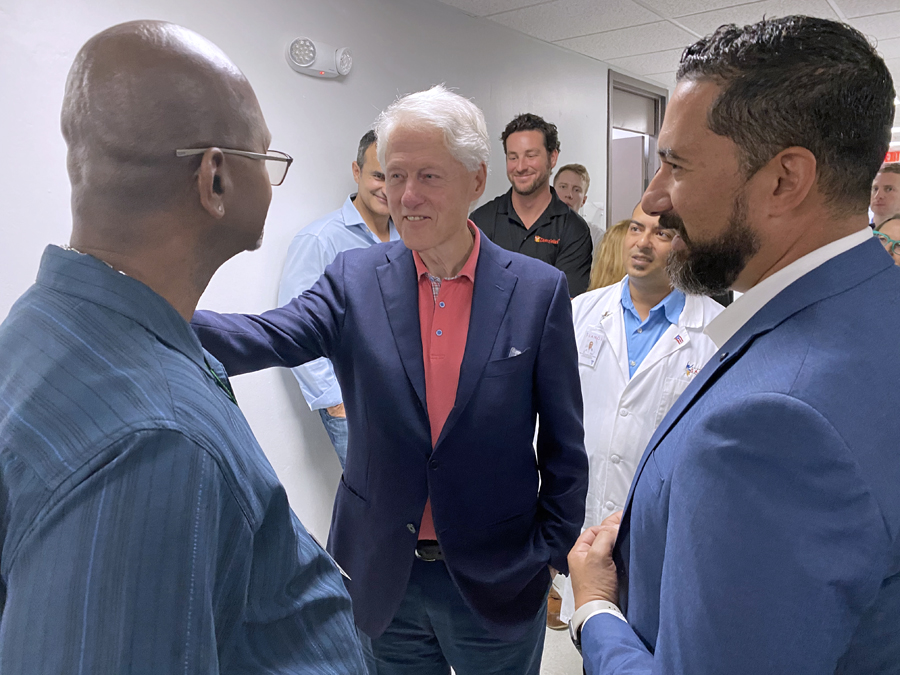
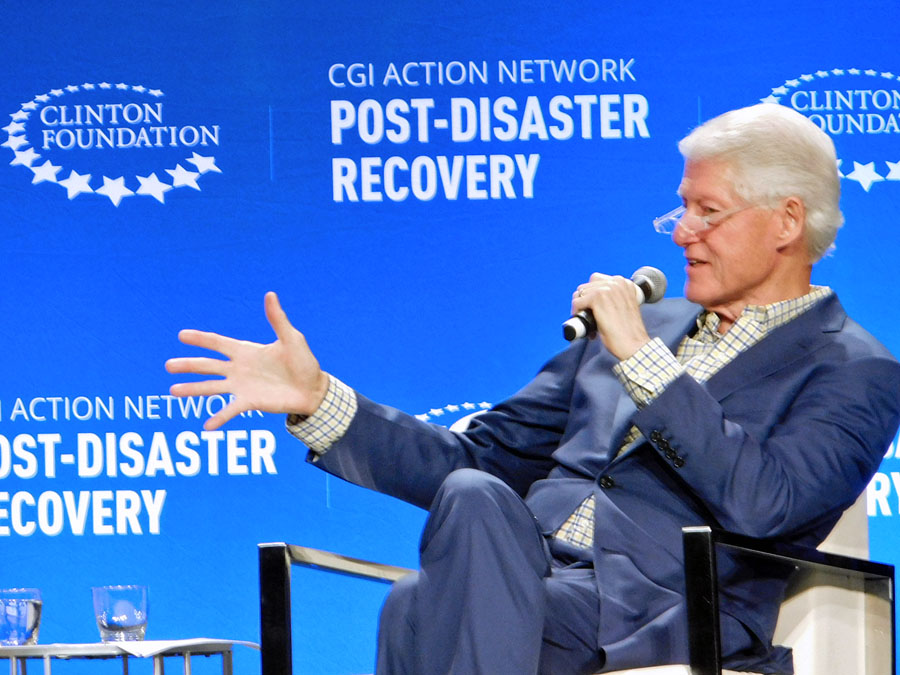




The usual talk, talk, talk. Do you hear the “build on”, ” partner with,” create an environment”, “create a partnership”, facilitate” and ANY OTHER EMPTY PHRASE that insures my name gets in the news, but I don’t really spend one Red Cent in actual money getting ANYTHING real accomplished? What a total joke these peopleare….. just ginning up BS so that THEY have a job!